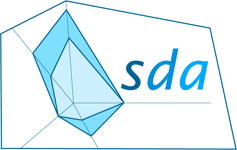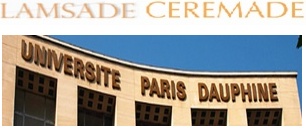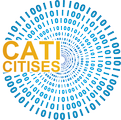This is an old revision of the document!
WORKSHOP DATA SCIENCE’2020
ADVANCES IN DATA SCIENCE FOR BIG AND COMPLEX DATA
University Paris-Dauphine, January 23-24, 2020
Massive and complex data are taking an increasing lying role in human activity. Organizing them and making sense of them to extract knowledge is the goal of DATA SCIENCE. In this Workshop one looks at objects described by classes of different statistical units. For example in Official Statistics, regions described by variables characteristic of hospitals, schools, inhabitants or in industry, nuclear power plant towers described by crack, corrosion, positioning, variables. In these cases, the famous x ∈ ℝn does not apply because the variables are unpaired (i.e. not defined on the same statistical units). To describe the internal variability of such classes, aggregated data in the form of explanatory “symbols” (intervals, distributions, lists, and so on) are used because description by conventional variables (only numerical or qualitative) does not allow this variability to be incorporated. The Symbolic Data Analysis (ADS) aims to extend the tools of Statistics and AI considered in the broadest sense (Villani Report) to this new type of data and is enjoying increasing success around the world.
Guest speakers will present: the likelihood of symbols and its application to the standard estimate in the case of massive and complex data (S. Sisson), object oriented statistics and application in geostatistical kriging (A. Menafoglio),”Piecewise” methods that transform the usual models into classes, making them more efficient (S. Bougeard), co-clustering extended to symbolic data (R. Verde), hypothesis testing with interval-valued data (A. Roy), modeling complex objects using dependent Dirichlet models (R. Emilion), economic symbolic data applied on effects of retirement on health outcomes (A. Srakar), the ordering (ranking) of complex objects and variables applied to the study of causes of death in European countries (S. Korenjak Cerne), the extension of the LDA (Latent Dirichlet Allocation) to symbolic data (E. Diday) and so on.
Call for communications: Advances in this context or open problems posed by laboratories or industrialists are welcome.
Submission: abstract including references in one Word page before le 5/01/2020 to diday8@gmail.com with DATA SCIENCE 2020 as object.
Registration: diday8@gmail.com (with name, institution, position) . Please specify the participant's name with his institution, department and country. Free of charge for registered participants, the number of places being limited.
Place of the workshop: University Paris-Dauphine. Place du Maréchal de Lattre de Tassigny 757016 PARIS.
Web site: http://vladowiki.fmf.uni-lj.si/doku.php?id=sda:meet:pa20





